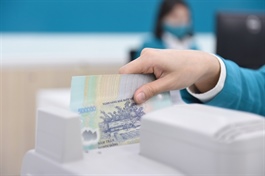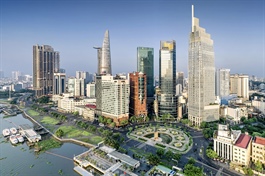Sectors will be supported to traverse global uncertainties
Sectors will be supported to traverse global uncertainties
Based on the economic achievements in 2024, Deputy Minister of Planning and Investment Tran Quoc Phuong told VIR’s Nguyen Huong about likely geopolitical movements and confidence levels in growth drivers this year.
Vietnam has maintained its growth momentum in 2024 with positive economic results. How do you assess the economic highlights of the year just past?

Deputy Minister of Planning and Investment Tran Quoc Phuong |
Vietnam’s economy has grown steadily, and international organisations have highly appreciated and adjusted our country’s growth forecasts in a positive direction. Credit rating agencies like S&P, Fitch, and Moody’s have all maintained Vietnam’s rating in 2024 at stable.
Bright spots of Vietnam’s macroeconomy reflected stability and strong resilience amidst numerous fluctuations worldwide. The economy grew strongly thanks to strong export growth and the government’s support policies. GDP growth in the fourth quarter reached the highest level of the year, and that of the whole year increased to 7.09 per cent.
The industrial, agricultural, and service sectors contributed significantly to growth. The industrial production index increased by 8.4 per cent on-year. Total retail sales of goods and consumer service revenue remained high, meeting demand for goods.
In addition, tourism stimulated increased consumer demand which spread strongly to production of other service industries such as transport, accommodation, food and beverages, travel, art activities, and entertainment.
Inflation is well controlled below the set target. The average consumption price index for the whole year increased by about 3.63 per cent, and core inflation in 2024 climbed by about 2.8 per cent, below the target set forth, despite great pressure in the global and domestic markets.
The import-export turnover hit an estimated annual scale of $786.3 billion, an increase of 15.4 per cent (equivalent to an increase of $105 billion) on-year. Export markets and items are diversified remarkably and more than 35 items reached $1 billion or more, including seven items reaching a turnover of over $10 billion.
Vietnam is among the top 15 developing countries in attracting the most foreign direct investment (FDI), at $38.2 billion. While global FDI flows are declining due to world’s uncertainties, in Vietnam it is still maintained.
Which issues of the economy do we need to pay attention to overcome when starting a new year and new development stage of the country?
The general difficulties of the world continue to have a significant impact on the economic situation of our country. Unpredictable natural disasters have affected socioeconomic development, creating pressure on macro management, growth, inflation, and ensuring major balances.
In addition, investment in financial and human resources for lawmaking is not commensurate with practical requirements.
Production, business, and enterprises still struggle with challenges, although enterprise development was getting positive at the end of 2024. Although the average registered capital per enterprise has gone up in the last months of 2024, it is only equivalent to the same period in 2023 at $400,000, and lower than the average of the 2019-2023 period, reflecting the caution of enterprises about new or expanded plans.
Aggregate demand has recovered but is unlikely to reach pre-pandemic levels and mainly comes from the FDI sector in terms of export turnovers, and FDI disbursement.
The purchasing managers’ index was positive, but fell slightly in November and December to below 50 points, so that Vietnam’s manufacturing industry lost growth momentum in the last month of 2024. Output and new orders increased slowly, companies cut down employees and inventories.
Capital addition to the economy was low, depending heavily on bank credit, while the capital market did not develop commensurate with its role as a medium and long-term capital channel.
The corporate bond market has not fully recovered, and the banking system has many potential risks of bad debt. Interest rates are under pressure to increase, and the USD/VND exchange rate had strong fluctuations, with pressure on the devaluation of VND. Foreign exchange reserves are currently decreasing and unsustainable.
How do you forecast the fluctuations of the world economy that may affect Vietnam this year?
In 2025, the geopolitical situation in the world may get more complicated. The US president may push a trade dispute further with China and some other countries. This will greatly affect many countries in the world, including Vietnam, in many different aspects, like import and export, currency, and FDI.
International financial institutions said that global economic growth would slow down in 2025, around 3.2-3.3 per cent due to potential risks from the energy crisis and supply chains. Average global inflation may decline in 2025 to 4.3 per cent. The reduction in inflation will have a positive impact on people’s lives and support the global economic recovery.
FDI flows in 2025 may tend to shift to emerging economies, green and sustainable industries, and high-tech sectors. The US, the European Union, and China are constantly adjusting their economic strategies to protect their interests, leading to a comprehensive restructuring of the global supply chain.
How do you assess Vietnam’s growth and development potential in 2025, and what will be the main pillars for growth?
Vietnam’s economy is projected to reach $506 billion in 2025, ranking 33rd globally. HSBC Vietnam believes that GDP will increase by 6.5 per cent and continue to maintain the highest level in the region.
Recent comprehensive institutional reforms are expected to have a profound impact on economic growth by reducing administrative procedures, improving public services, and cutting business costs for enterprises, thereby further promoting growth drivers.
Public investment is expected to be the main driver of growth, leading the economy to develop by huge projects such as the North-South high-speed railway. Connecting transport infrastructure will create links between regions, create industrial belts, and boost goods circulation.
The amended Law on Public Investment is expected to support economic recovery, enhance decentralisation and simplify processes. The amendments to the Law on Bidding aim to harmonise the government’s policies with those of official development assistance donors. All these moves speed up the project process and encourage actual capital flows, especially public investment.
FDI attraction is forecast to maintain good growth momentum, especially disbursement. International organisations assess that Vietnam has emerged as a bright spot, rising in FDI attraction. The establishment of an investment support fund will add some more incentives, and ensure the competitiveness of some sectors that need funding encouragement, especially the high-tech sector.
Growth in the service and tourism sector this year is also being supported by the number of international visitors to Vietnam continuing to maintain impressive growth momentum.
The export market in 2025 is forecast to continue to grow similar to 2024 due to many free trade agreements being effectively implemented. However, exports are likely to face increased pressure due to unstable global geopolitical developments, increasing sea transport costs, exchange rate pressure, competition, new trade barriers, anti-dumping duties, diverse product ranges, and much more.
Inflation risks are also forecasted to push the USD highly. In 2024, VND depreciated by about 5 per cent and the exchange rate will be affected by the US economic policy this year. Besides that, some factors may push inflationary pressure in 2025, such as expensive costs of imported raw materials, adjustment of prices of state-managed services on health services and education tuition, and increase in retail electricity prices.
Stimulus packages, lowering lending interest rates, expanding credit, and boosting public investment will ease things for the economy, but can also put pressure on the price level if the cash supply is not properly controlled.
| Tackling slowing public investment for good of nation Setting a strong impression for socioeconomic advances Dynamism part of growth ambitions Dedicated policies driving transport development plans Vietnam continues to see growth in FDI |

























